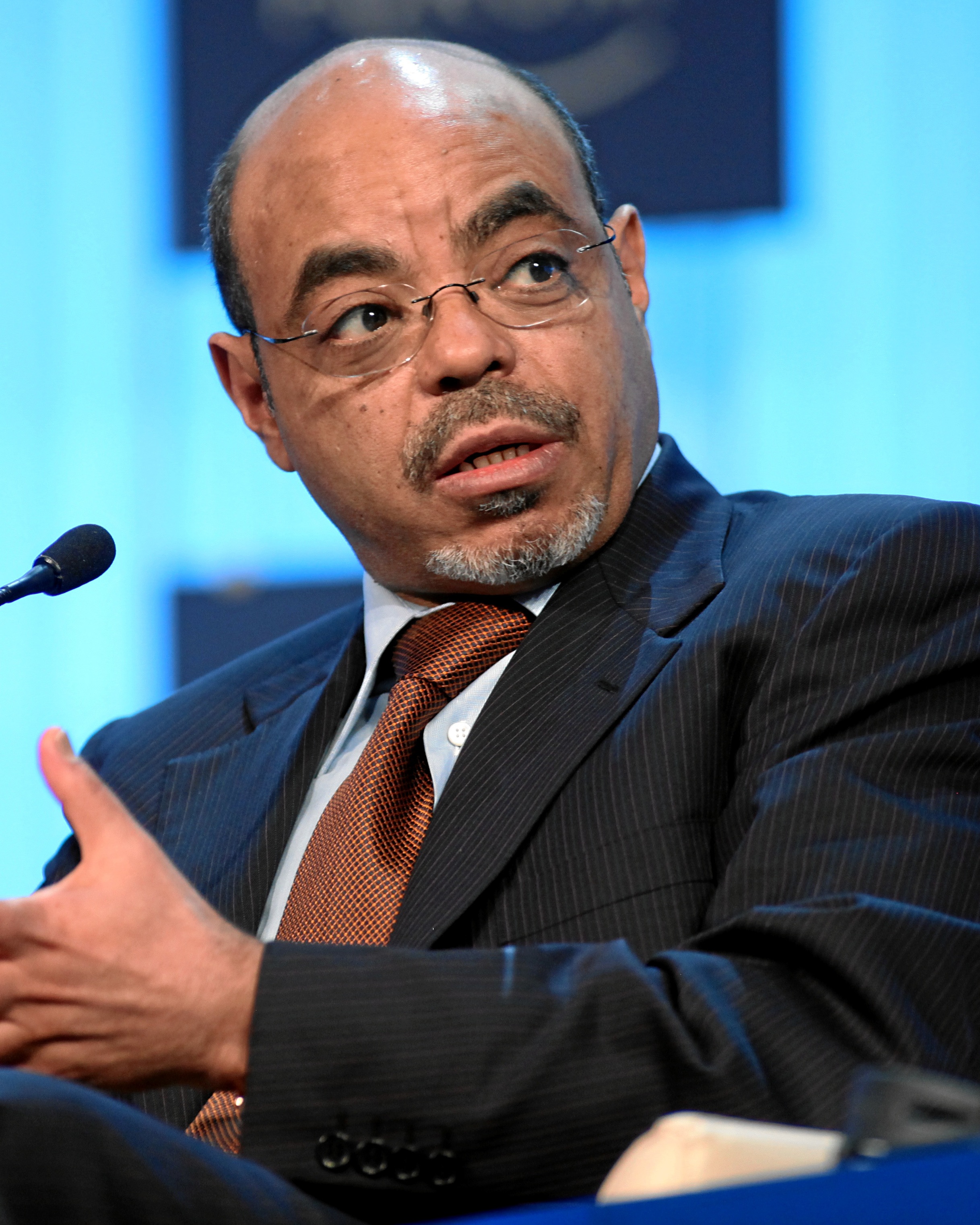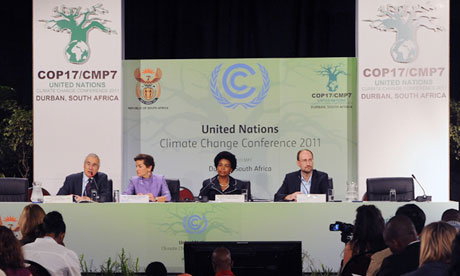The Durban climate change
negotiation was billed as an African COP but for Africa and much of the
developing world, outcomes of the talks spell doom.
Last December’s climate change
negotiations in Durban, South Africa marked a critical phase in rescuing the
earth and humanity. However, the Durban decisions do not guarantee a safe
future for the world’s population especially in Africa.
The regime change, that the ‘DurbanAction on Enhanced Action’ (Durban Mandate) represents, fundamentally shifts
the burden of climate change to developing countries from developed nations
which are responsible for polluting the atmosphere, to trigger the phenomenon,
in the first place.
The Durban talks produced three main
outcomes. Durban mandate launched a process for the negotiation of a new
climate treaty to be implemented from 2020.
The mandate also extended the
Kyoto Protocol (KP) by a single term. The current emission reduction period
expires in December 2012 and an extension was essential to avoid a gap between
the two periods and to save the planet from inevitable overheating.
But the Durban decision on the KP
essentially consigns the protocol, which remains to date, the only legally
binding climate treaty, to life support. Days after Durban, Canada withdrew
from the KP. Russia and Japan have threatened to join Canada in abandoning the
KP. The European Union (EU) failed to raise its emission cut targets opting for
the lowest possible reduction levels.
The Durban mandate agreed on
measures to implement some decisions adopted by earlier COPs including
establishment of the Green Climate Fund (GCF), transparency mechanisms,
technology and adaptation cooperation. It is unclear just yet how some of these
decisions will be implemented with the dismantling of the existing climate
regime. The GCF was set up as an empty shell with no country willing to put in
the funds needed to enable developing countries to address climate change and
to pursue a cleaner and more sustainable development path.
For Africa and much of the
developing world, the outcome of the Durban talks was a major disaster.
Africa’s major collective demands were swept aside and even where there was
agreement of some sort, the decisions are empty shells at best. The Durban
mandate effectively ushers in a new climate regime as it throws out the equity-
and science-based regime that has guided international negotiations until last
December United Nations climate talks in South Africa.
Far from building confidence, Durban dismantled the trust and transparency as well as equity embedded in the Convention.
Equity and ‘Common But Differentiated Responsibilities’ (CBDR) have
been central to the climate change Convention and treaty. CBDR underscores the
principle that the highest polluters bear the largest burden of the cost of
addressing climate change.
The Durban mandate ignores this
fact. Under the Durban mandate both developed and developing countries are
treated as equals. This means that countries in Africa, which together
contribute under 4 per cent of global greenhouse gases (GHG), will have to cut
their emissions as developed regions such as the European Union and the United
States which have over the last two centuries damaged the atmosphere and
continue to spew more than their fare share of GHG into the atmosphere. This
will stifle Africa and other developing regions’ development to deepen poverty
and economic deprivation and fuel insecurity.
The Durban mandate thus offers rich
countries a convenient escape out of their prior internationally
legally-binding commitments under the Convention and treaty.
Capitulation
But in Durban, Africa held on to its
equity- and science-based position until the last 48 hours of the two-week long
climate change talks.
A number of reasons seem to account
for this gargantuan capitulation. Among these was the intense direct pressure
mounted on Africa by the European Union. The EU combined this pressure with
divide and rule tactics which undermined the unity of African countries.
But Africa’s own weaknesses also
contributed a great deal to the continent’s demands and expectations being
swept aside in the final Durban mandate.
 |
| Nasr (Egypt) & Tosi (DRC), chair of Africa Group |
In the run up to Durban, African
countries updated and consolidated their common negotiating positions on
climate change in Bamako, Mali. These positions were affirmed at the highest
level by African heads of state and government in Malabo, Equatorial Guinea in
July 2011.
At the fourth special session of
AMCEN in Bamako, African ministers of environment updated the continent’s
common position on climate change to demand a second and subsequent commitment
periods of the Kyoto Protocol with raised, rapid and sustained emission cuts;
an additional legally binding outcome based on the Bali Action Plan, including
comparable mitigation efforts for the United States (which is not a signatory
to the protocol) and other measures to enable African countries adapt to the
devastating effects of climate change.
Africa’s demands also included finance,
technology and resource support for countries on the continent to contribute to
global action on climate change in the context of sustainable development.
The weaknesses of Africa in the
negotiations were perhaps most highlighted when Meles Zenawi, the Prime
Minister of Ethiopia, effectively instructed African delegates to step back
from the agreed common African position and adopt the European Union’s
illegitimate positions on major issues at stake at the negotiations in total
violation of the remit of his authority as the spokesperson of the ad hoc
Committee of African Heads of State and Government on Climate Change
(CAHOSOCC).
 |
| Ethiopia's Zenawi |
Addressing a mixed group of African
negotiators and government ministers on December 8, Zenawi asked the African
representatives to prioritise two issues. Firstly, they should, as way to
securing a second period for the KP, accept a mandate for a new legally binding
treaty on mitigation which covers all countries. Second, they should work
for the adoption of a decision on the Green Climate Fund even if it was an
empty shell.
In giving these instructions, Zenawi
over-stepped his mandate. As spokesperson of CAHOSOCC, the Ethiopian
prime minister does not have the authority to direct African delegates on how
to negotiate. CAHOSOCC is a monitoring body that is only meant to observe
the negotiations and report to the Heads of State and Government.
The technical negotiators and
ministers draw their mandate directly from the collective African positions
adopted by the Heads of State and Government at their Summit.
In a further complication of
Africa’s negotiating strength, the troika of Zenawi, Algeria and Kenya took off
to hold bilateral talks with some actors including the European Union and the
United States, thus holding the rest of Africa hostage.
Concessions
President Jacob Zuma’s stance as
host of the talks also contributed to this process. Preoccupied as host
with ensuring the ‘success’ of the meeting, Zuma was keen to offer concessions
to the EU even when these did not accord with Africa’s collective
position.
On many occasions, Zuma called on
African negotiators to meet Europe half-way. Given that it was Europe which was
keen on overturning the basic principles of the UNFCCC regime that Africa was
defending, this call to meet Europe half-way was basically a call for Africa to
give in to Europe’s fundamental project.
The host’s attitude played into the
hands of the EU and developed countries as it robbed Africa of some of the
necessary gravitas to push back the pressure from rich developed countries to
abandon its principled demands.

No comments:
Post a Comment